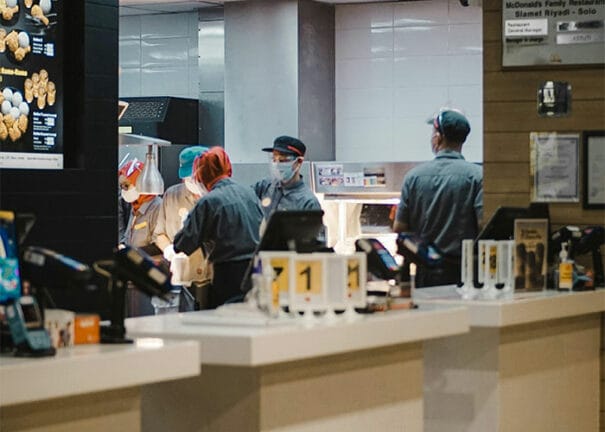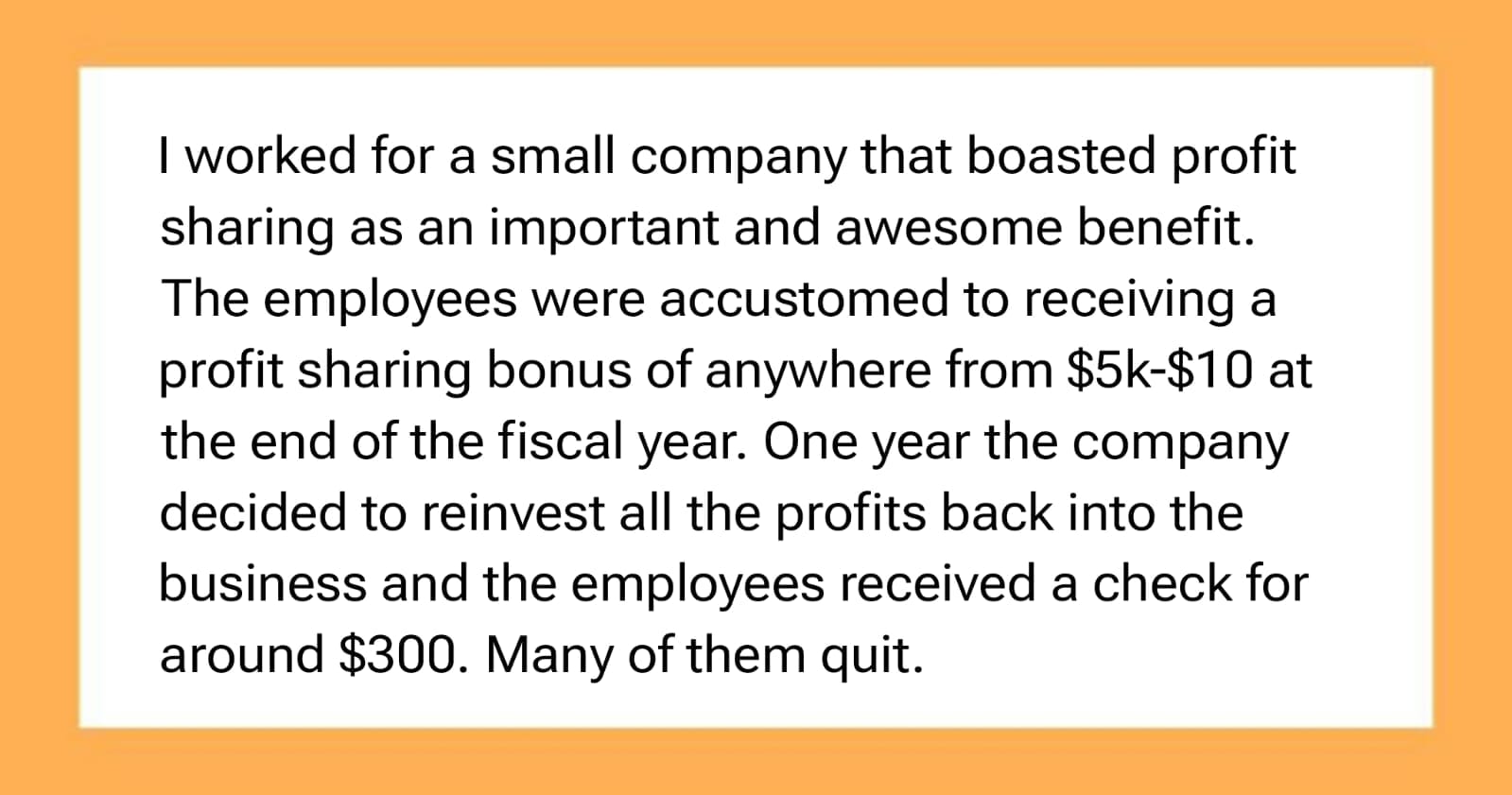20 Employees Remember the Office Moment That Caused Everyone to Quit
Working in an office comes with its fair share of frustrations—some personal, some affecting the entire team. While many fantasize about staging a mass walkout in protest, the reality is that most people stay put due to financial responsibilities and job stability.
However, every now and then, the unthinkable happens—a moment so outrageous that an entire workforce quits at once. These rare but dramatic events have actually played out in real life, leaving behind stories of collective rebellion and workplace justice.
Scroll below to read firsthand accounts of the bold moments that led entire teams to walk out together.
#1

Image source: Jeff Tipton, wocintechchat / unsplash (not the actual photo)
That’s the perfect example of how poor communication or just the idea of instability can trigger a mass exodus. Even though the company didn’t intend to push people away, the announcement alone was enough for employees to start jumping ship.
People don’t like uncertainty—if they hear their job is disappearing, they’re not going to wait around to see what happens. They’ll secure new opportunities before the market is flooded with other job seekers. In the end, the company unintentionally created the very staffing crisis they were hoping to avoid.
#2

Image source: Heinz Beanz, Alexander Mils / unsplash (not the actual photo)
That’s a slow-motion walkout in action. When a company consistently underpays its employees, especially in a competitive job market, people will leave the moment they find something better.
It’s not always a dramatic, all-at-once mass resignation, but a steady trickle of departures can be just as damaging. Eventually, the employer either wises up and raises wages—or they’re left scrambling to fill roles with less experienced (or desperate) workers.
People aren’t going to stay loyal to a company that refuses to pay them what they’re worth, especially when better opportunities are readily available.
#3

Image source: Alan Higgins, Campaign Creators / unsplash (not the actual photo)
Classic case of “if it ain’t broke, don’t fix it”—but they tried anyway and ruined everything.
The new management came in, didn’t understand the business, and tried to cut costs by squeezing commissions. Instead of saving money, they drove away the talent that made the business successful.
Replacing experienced, motivated workers with cheaper, uninspired ones only led to a downward spiral. The result? A once-profitable operation collapsed entirely. Meanwhile, the original German sites—where they didn’t mess with a working system—are still thriving.
It’s a textbook example of short-sighted cost-cutting killing long-term success.
#4

Image source: Paul Irving, Kübra Arslaner / unsplash (not the actual photo)
Wow, that was like watching a corporate thriller play out in real life!
Those two salespeople knew exactly what they were doing—they had the receipts, they weren’t afraid to walk, and they made sure management couldn’t just sweep it under the rug.
It’s wild how blatant fraud can go unnoticed (or ignored) until someone forces the issue. And the fact that top management should have caught it but didn’t? Either pure incompetence or willful blindness.
In the end, the guilty parties got the axe, but it sounds like the company barely dodged a total collapse. Meanwhile, those two probably went on to much better jobs with a great story to tell.
#5

Image source: Odd Boots , Campaign Creators / unsplash (not the actual photo)
That’s a huge morale killer. When a company sets an expectation—especially one as significant as a $5K–$10K bonus—and then suddenly slashes it without warning, people feel betrayed.
It’s one thing if profits were down and management was upfront about it. But reinvesting everything without considering the employees who helped generate those profits? That’s a surefire way to make people walk.
Loyalty is a two-way street—if a company stops valuing its employees, the employees will stop valuing the company. And in this case, they voted with their feet.
#6

Image source: Paul Nerstrand Maakestad, Nick Pampoukidis / unsplash (not the actual photo)
That’s a slow-motion collapse if I’ve ever seen one. When a company is literally borrowing money just to make payroll, that’s a massive red flag. And when employees are asked to take pay cuts on top of that? It’s a sinking ship.
It’s telling that people didn’t quit immediately—sometimes, especially in smaller towns, there aren’t many options. But as soon as people found something better, they left. And in the end, the company couldn’t survive.
Honestly, it sounds like you and your spouse got out at the right time. A business running on emergency loans just to function is already on borrowed time.
#7

Image source: Eric Overton, ThisisEngineering / unsplash (not the actual photo)
That’s an astonishing level of corporate self-sabotage.
Messing with people’s retirement savings—especially a group of engineers who are literally trained to analyze numbers—was a catastrophic mistake. They ran the numbers, saw the writing on the wall, and bailed.
The company essentially created a financial incentive for its best employees to leave, all because management was desperate for a loan and thought they could play fast and loose with retirement funds. And the kicker? They still went under, getting scooped up for pennies by a competitor.
If there’s a textbook case of how poor leadership can tank a company, this is it.
#8

Image source: Thornton Kelly , Visual Karsa / unsplash (not the actual photo)
That escalated quickly—from a mass walkout to an almost McMurder!
It sounds like everyone hated that assistant manager, and honestly, their dramatic resignation letter was a bold move. But what a way to get thrown into the deep end—first day on the job, and suddenly you’re running the entire grill? That’s some trial-by-fire fast-food chaos.
And the assistant manager? Classic case of power going to someone’s head in the worst way possible. Turns out being a tyrant in a high-turnover job like McDonald’s is a bad idea—people will quit en masse, and in extreme cases… some might even try to take revenge. 😳
#9

Image source: Ruth Barr, Magnet / unsplash (not the actual photo)
That was a spectacular example of management totally misreading the room and then scrambling to fix their mistake before an outright mutiny.
Three weeks’ notice for a major holiday schedule change—when people had already booked travel—is a management fail of epic proportions. If they’d stuck to their decision, they would’ve had hundreds of “sick” employees on Thanksgiving, leaving them massively understaffed. No way they were gonna risk that level of chaos!
Also, the fact that after all the drama, they ended up with more people than they needed is just chef’s kiss 🤌. They caused unnecessary panic and then basically had to send people home anyway. Absolute corporate clownery.
#10

Image source: Kelly Green, Toa Heftiba / unsplash (not the actual photo)
That’s the classic recipe for mass resignations. Burnout isn’t just about working hard—it’s about working hard without support, fair pay, or a clear direction. People can grind through tough workloads if they feel valued and have a sense of purpose, but when management is MIA, expectations are unrealistic, and salaries are insulting, people check out fast.
Companies love to act shocked when turnover spikes, but they ignore the blaring warning signs:
✅ Overworked staff with no backup
✅ Lack of leadership (or bad leadership)
✅ No room for growth or fair pay
✅ Work-life balance? What’s that?
Burnout isn’t inevitable—it’s just bad management in action.
#11

Image source: Chris , Curated Lifestyle / unsplash (not the actual photo)
That sounds like a textbook corporate disaster—new leadership comes in, makes drastic changes without understanding the consequences, morale tanks, and a slow-motion exodus begins.
The worst part? When companies double down on bad policies instead of fixing them. Employees are forced into damage control mode, knowing full well that they’re fighting a losing battle. Then leadership bails once the ship is sinking, leaving the wreckage behind.
Glad to hear you got out and landed somewhere better. 15 years of loyalty deserved way more respect than being tossed aside with no acknowledgment.
#12

Image source: Jim Reifsnyder-Smith, Michal Balog / unsplash (not the actual photo)
That’s a monumental miscalculation by Disney. They expected people to just uproot their lives for marginal financial benefits that only executives would truly enjoy.
And the assistants being forced to “reapply”? That’s corporate cruelty at its finest—zero loyalty to the people who kept things running. No wonder most employees bailed immediately or used the time to escape.
Now they’re left with a massive brain drain and a workforce that resents leadership. It’s wild how these companies never seem to learn.
#13

Image source: Cassy Veronica, Pablo Merchán Montes / unsplash (not the actual photo)
That’s the definition of holding a workplace together with duct tape and vibes. It’s crazy how one resignation can pull the whole thread and unravel everything.
The fact that even the managers bailed just proves how bad it was. Sounds like everyone was only there for each other—not for the job, not for the company. Once that support system collapsed, there was no reason left to stay.
#14

Image source: Rick Sheehy, Camille Chen / unsplash (not the actual photo)
That guy really scorched the earth with his behavior. When word gets around that a boss is a nightmare, good luck finding employees—especially in a small, tight-knit community like Cape Cod.
The fact that even the Irish summer workers (who usually take what they can get for seasonal work) wanted nothing to do with him says everything. And then threatening other businesses and trying to mess with visas? That’s straight-up villain behavior. No wonder he went under—sounds like it was long overdue.
#15

Image source: Candy Johnson-Brown, Maxime / unsplash (not the actual photo)
That was P&O Ferries, and it was a complete PR disaster. Firing 800 employees over Zoom with zero notice and then immediately replacing them with cheaper, foreign agency workers was a brutal move. The backlash was massive, from the public, politicians, and even the Royal Family.
The fact that their services are still not back to normal while competitors are raking in the profits is some serious corporate karma. They tried to cut costs, but instead, they burned their own business down.
#16

Image source: Ronda Spears, The Jopwell Collection / unsplash (not the actual photo)
Sounds like that manager was a walking disaster. When more than half a team either transfers or outright quits, that’s a massive red flag. And the fact that they only fired her after you left—when they could have listened to their employees earlier—is just bad leadership.
Props to you for giving an honest exit interview! Sounds like your feedback was the final push they needed to do what should have been done sooner.
#17

Image source: Kathy Clark, Dan Burton / unsplash (not the actual photo)
That’s wildly unprofessional (and probably illegal) for your boss to fire you over your personal life. But the fact that everyone else quit in solidarity? That’s the kind of loyalty you don’t see every day!
And then you landed a better-paying job in a week? That’s the ultimate win. Your old boss got exactly what he deserved—an empty office and no one to blame but himself.
#18

Image source: Mary Martin Hayes, Kateryna Hliznitsova / unsplash (not the actual photo)
That’s peak corporate absurdity right there. Like, “Oh yeah, let me just schedule my flu for next Tuesday and pencil in a funeral for Friday at 3 PM.”
Did anyone actually take that policy seriously, or did people just call out anyway and deal with the nonsense later?
#19

Image source: Mary Ross, Getty Images / unsplash (not the actual photo)
That’s next-level insanity. She literally made everyone sign a contract for food safety compliance, then immediately turned around and demanded food safety violations?
She really thought nobody would notice the contradiction? That’s gotta be one of the fastest mass walkouts ever. Did the health department ever get wind of this?
#20

Image source: Haruhi Suzumiya, Getty Images / unsplash (not the actual photo)
Well, that’ll do it. Todd had hands, and everyone had limits.
Did management just ignore it, or did they finally step in after the mass exodus?



